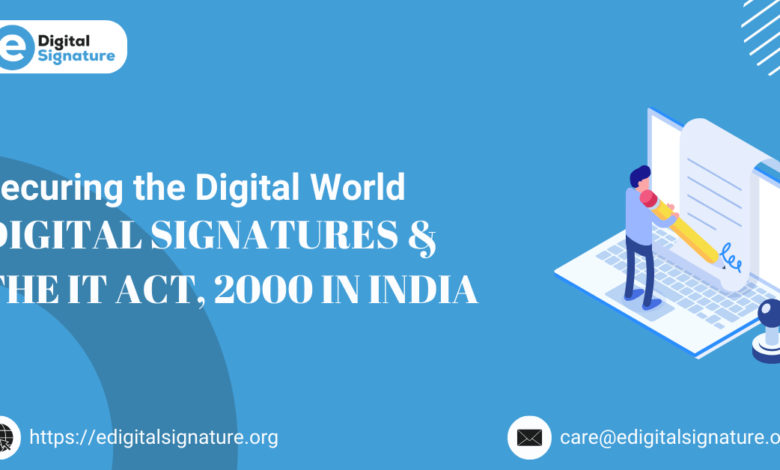Securing the Digital World: Digital Signatures and the IT Act, 2000 in India

In today’s increasingly digital landscape, the need for secure and verifiable transactions has become paramount. Digital signatures, acting as the electronic equivalent of a handwritten signature, offer a solution to this critical need. In India, the Information Technology Act, 2000 (IT Act) provides the legal framework for digital signatures, fostering trust and security in electronic transactions.
This article explores the concept of digital signatures, their functionalities, and how the IT Act empowers their use in India. We will delve into the legal provisions, the role of certifying authorities, and the impact of digital signatures on various aspects of Indian society.
Understanding Digital Signatures
A digital signature (DS) is a cryptographic technique that ensures the authenticity and integrity of an electronic document. It functions like a tamper-proof seal, verifying the identity of the signer and guaranteeing that the document hasn’t been altered after signing.
The process involves complex cryptography. When a document is signed digitally, a unique mathematical hash is generated. This hash acts like a fingerprint, representing the content of the document in a compressed form. The signer then uses their private key to encrypt the hash, creating the digital signature. Anyone with the corresponding public key (which is freely available) can decrypt the signature and verify the hash. If the recreated hash matches the original document’s hash, it proves that the document is genuine and hasn’ been tampered with since signing.
The IT Act, 2000: A Brief Overview
The Information Technology Act, 2000, was enacted to provide a legal framework for electronic governance by giving recognition to electronic records and digital signatures. It was a significant step towards promoting digital transactions and e-commerce in India. The Act defines key terms related to digital signatures, outlines the legal recognition of digital signatures, and sets forth the regulations for certifying authorities.
The IT Act and Digital Signatures
The IT Act, enacted in 2000, played a pioneering role in recognizing the legal validity of digital signatures in India. Here’s how the Act empowers their use:
Legal Equivalence:
Section 3 of the IT Act allows subscribers to authenticate electronic records using digital signatures. Section 5 further grants legal equivalence to digital signatures issued by licensed Certifying Authorities (CAs). This means a digitally signed document holds the same legal weight as a paper document with a wet signature.
Authentication and Non-Repudiation:
Digital signatures, as described earlier, ensure the authenticity of the signer and the document’s integrity. This empowers legal proceedings as the signer cannot deny signing the document (non-repudiation).
Secure Transactions:
The IT Act facilitates secure electronic transactions across various sectors, including e-commerce, e-governance filings, and online contracts.
Role of Certifying Authorities (CAs)
The IT Act establishes a framework for CAs, trusted third-party entities responsible for issuing and managing digital signature certificates (DSCs). These certificates electronically bind the signer’s identity to their public key. Here’s how CAs ensure trust in the digital signature ecosystem:
Strict Verification:
CAs conduct thorough verification procedures before issuing DSCs, ensuring the applicant’s identity and adherence to security protocols.
Digital Signature Infrastructure (DSI):
The IT Act mandates a robust DSI, a network of CAs overseen by the Controller of Certifying Authorities (CCA). The DSI ensures the secure issuance, verification, and revocation of DSCs.
Impact of Digital Signatures in India
Digital signatures have significantly impacted various facets of Indian society:
E-governance:
The government actively promotes e-filings and online services, all requiring secure authentication. Digital signatures facilitate these processes, enhancing efficiency and transparency.
Business and Commerce:
Secure online transactions are crucial for businesses. Digital signatures enable secure e-commerce transactions, online contracts, and digital tax filings.
Financial Services:
Banks and financial institutions leverage digital signatures for secure online banking, loan applications, and other financial transactions.
Healthcare:
Digital signatures can used for secure medical records management, e-prescriptions, and online appointments, safeguarding patient privacy and data integrity.
Challenges and Future Prospects
Despite the numerous benefits, the adoption of digital signatures in India faces certain challenges. These include a lack of awareness among individuals and small businesses, concerns about the security of digital signature infrastructure, and the need for continuous technological advancements to combat emerging cyber threats.
Future Prospects
The future of digital signatures in India looks promising. With the increasing digitization of services and the government’s push towards a cashless economy, the use of digital signatures is expected grow. Continuous efforts to enhance cybersecurity, raise awareness, and improve the regulatory framework will be crucial in ensuring the widespread adoption and trust in digital signatures.
Also Read, Digital Signature Certificate for GST Return
Conclusion
Digital signatures, coupled with the robust framework provided by the IT Act, have revolutionized the way India conducts business and interacts with the government electronically. As the digital landscape continues to evolve, digital signatures will play an increasingly critical role in ensuring secure, verifiable, and legally binding transactions in the digital age.
However, continuous efforts are needed to raise awareness about digital signatures and address potential challenges, such as cyber security threats and ensuring wider accessibility for all sections of society. By embracing digital signatures and continually strengthening the supporting legal and technological infrastructure, India can unlock the full potential of a secure and trustworthy digital ecosystem.



